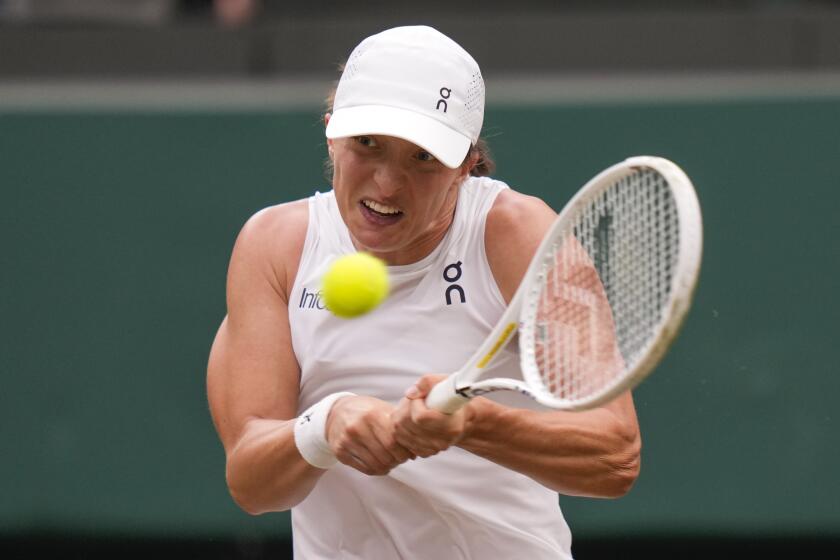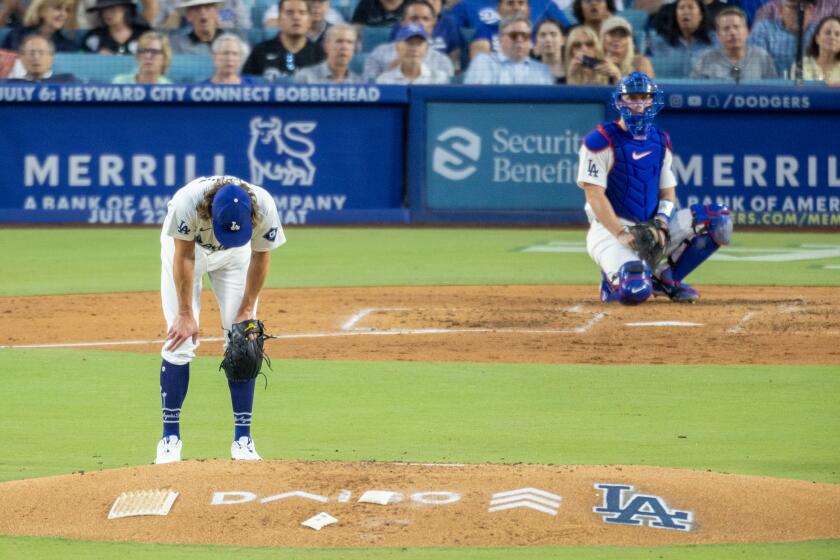Boris Becker’s Life Will Never Be Same Again : A Great Deal of Money, and Demands on His Time, Await Wimbledon Winner
Life probably will never be the same for Boris Becker, Wimbledon’s newest, youngest, men’s singles champion.
Anonymity was lost the moment he defeated Kevin Curren at the All England Lawn Tennis and Croquet Club.
“I am the first German to ever win Wimbledon and I think this will change tennis in Germany now. Maybe now they have an idol,” the 17-year-old from Leiman, West Germany, said after last Sunday’s final.
Indeed, they do.
In fact, the prospect of being chased by fans, reporters, photographers and television crews, prompted Becker to sidestep a hometown victory celebration. Instead of returning to Leiman, he slipped out the side door of his hotel and caught a plane for Monte Carlo, where he has an apartment.
The folks back home had to wait for their hero, and Boris Becker quickly learned that being a hero had its problem. He also learned that if the Wimbledon title brings riches, it also brings pressures.
The money Becker won at Wimbledon is just a pittance compared to what the title is worth in endorsements and future earnings. Even now, some 10 years after he won the prestigious grass-court tournament, it is estimated Arthur Ashe earns $2 million to $3 million a year.
Money, however, is far from Becker’s mind right now. In fact, he twice has forgotten to pick up tournament winnings.
At Wimbledon, he didn’t realize he had won $163,800 until he was told about it at a post-game news conference.
“I have no idea what I will spend my money on,” said the red-haired, freckle-faced champion.
As the newest tennis sensation, every tournament promoter in the world will want Becker as a gate attraction. U.S. fans will be able to see him play at a clay-court tournament beginning July 22 in Indianapolis.
If he maintains the spotlight, Becker likely will learn--as John McEnroe and Sweden’s Bjorn Borg did before him--that constant demands, in time, wear a little thin.
“I’ve found it’s getting to be a little overwhelming being No. 1,” McEnroe said after he was eliminated by Curren in the Wimbledon quarterfinals. “That’s another thing I need to re-group about.”
The feisty left-hander, halted in his bid to become the first American to win three consecutive Wimbledon men’s singles titles, said he now understood why Borg walked away from the game when he was 26, the same age McEnroe is now.
“There are so many things you have to learn to handle,” McEnroe said.
Four years ago, Borg said: “It got too much. I just couldn’t face going on.”
The pressure, to a great extent, is self-imposed. Top players compete in 15 Grand Prix events and play exhibitions, where the big money is made.
In 1983, when Yannick Noah became the first Frenchman to capture the French Open, he was an instant national hero. When the pressure became too much, he escaped by moving to New York City “where I can walk the streets without being mobbed.”
But Curren had words of praise for Becker’s stamina.
“As a 17-year-old, it is a tremendous boost for him to be able to handle the pressures at that age,” he said.
More to Read
Get our high school sports newsletter
Prep Rally is devoted to the SoCal high school sports experience, bringing you scores, stories and a behind-the-scenes look at what makes prep sports so popular.
You may occasionally receive promotional content from the Los Angeles Times.






